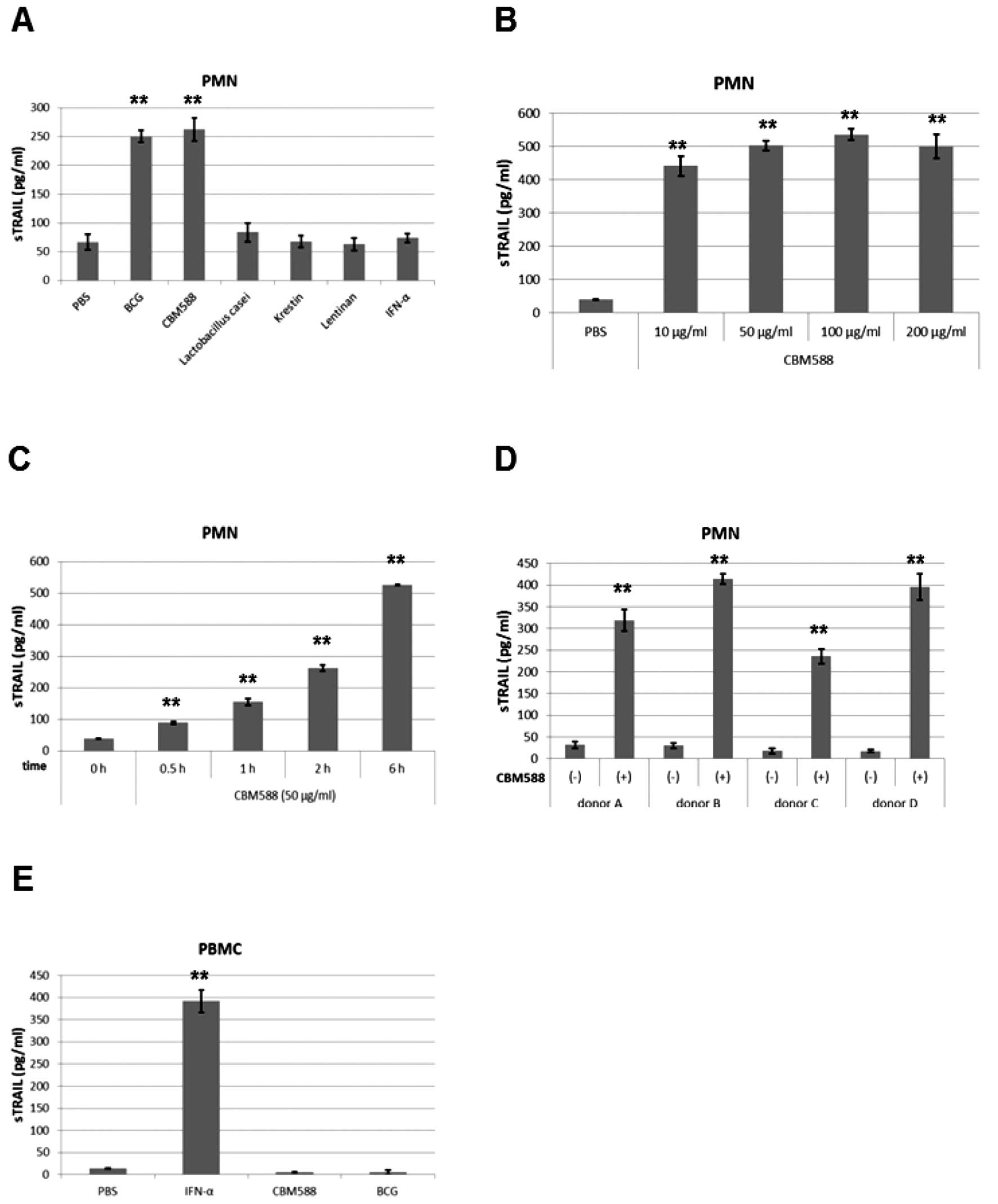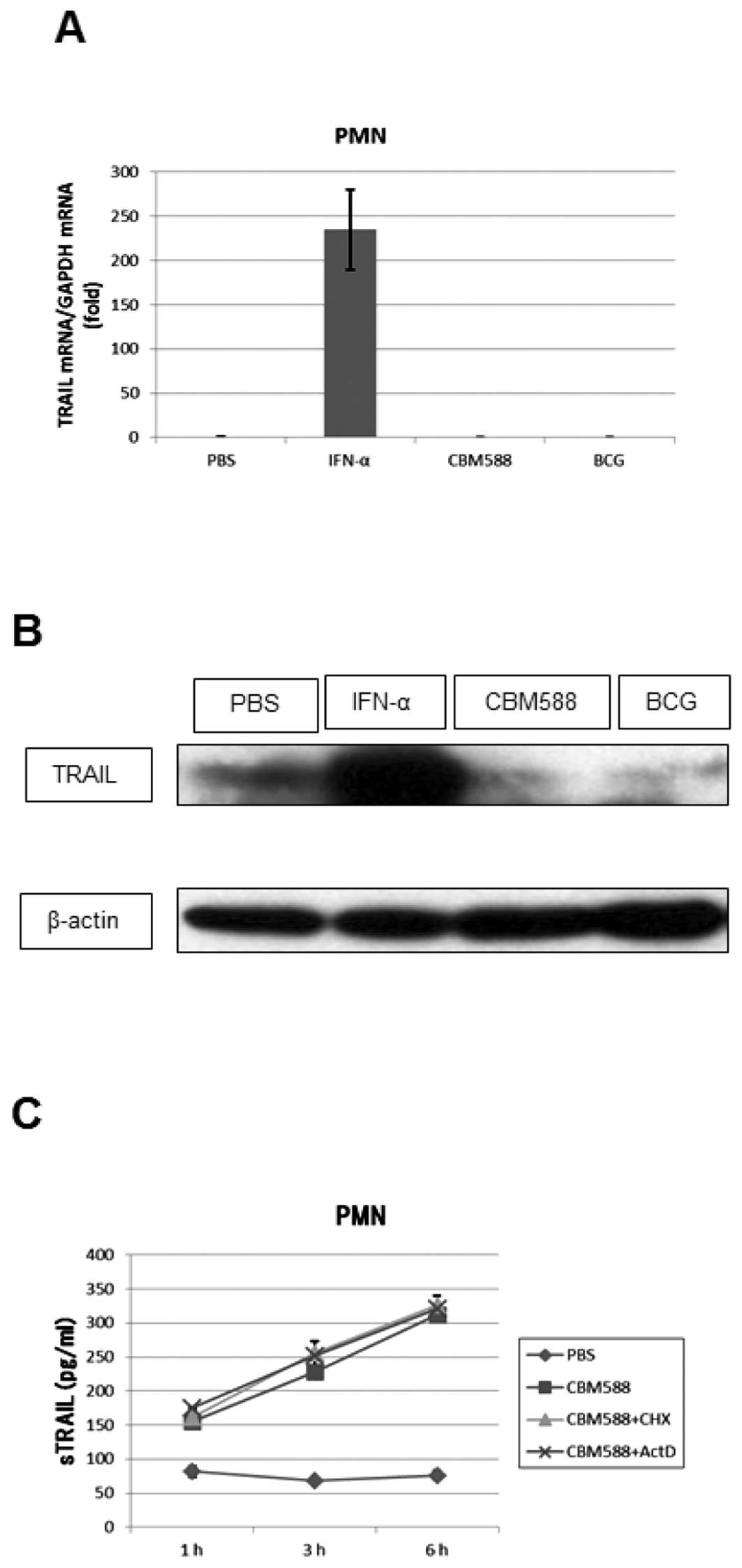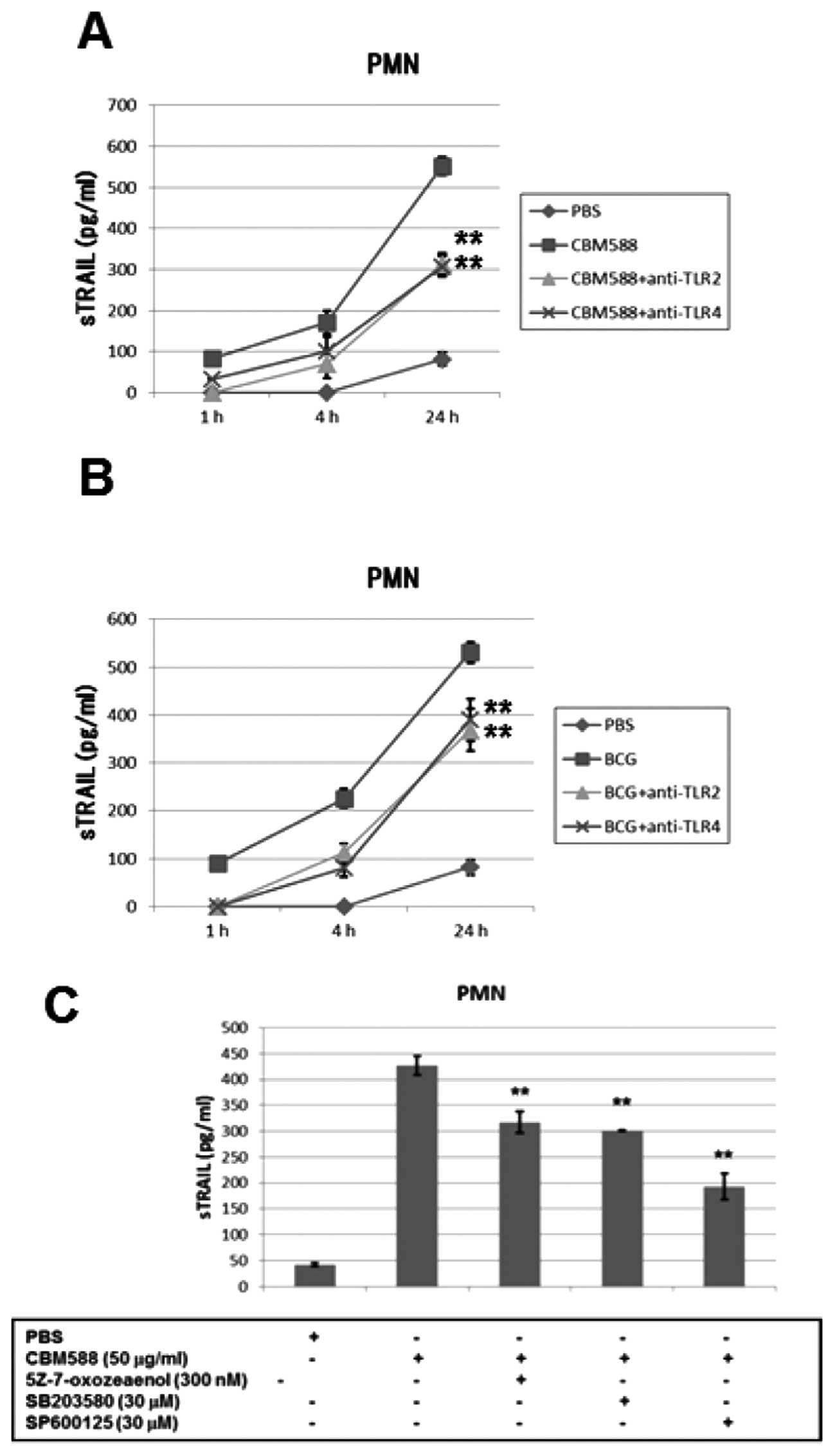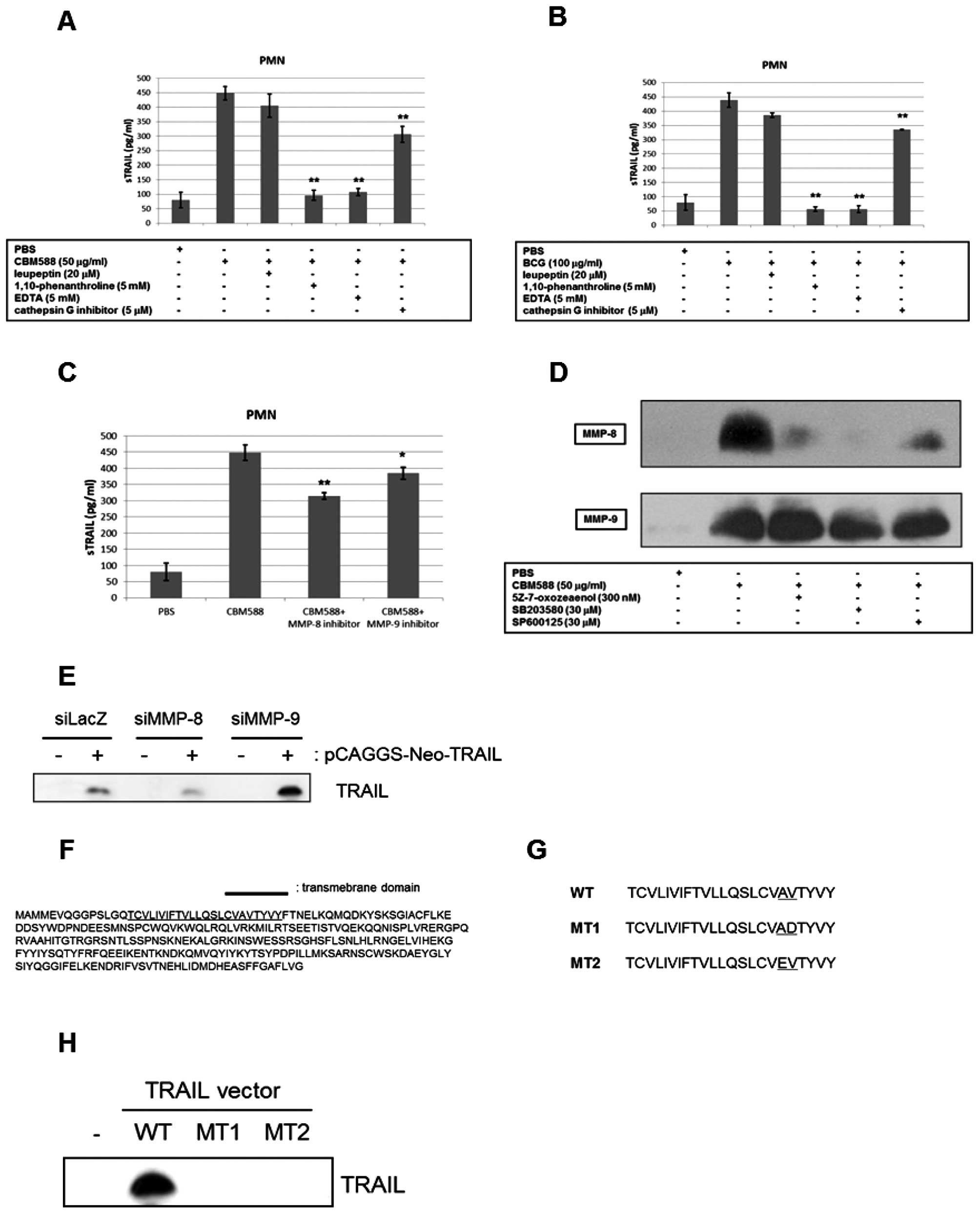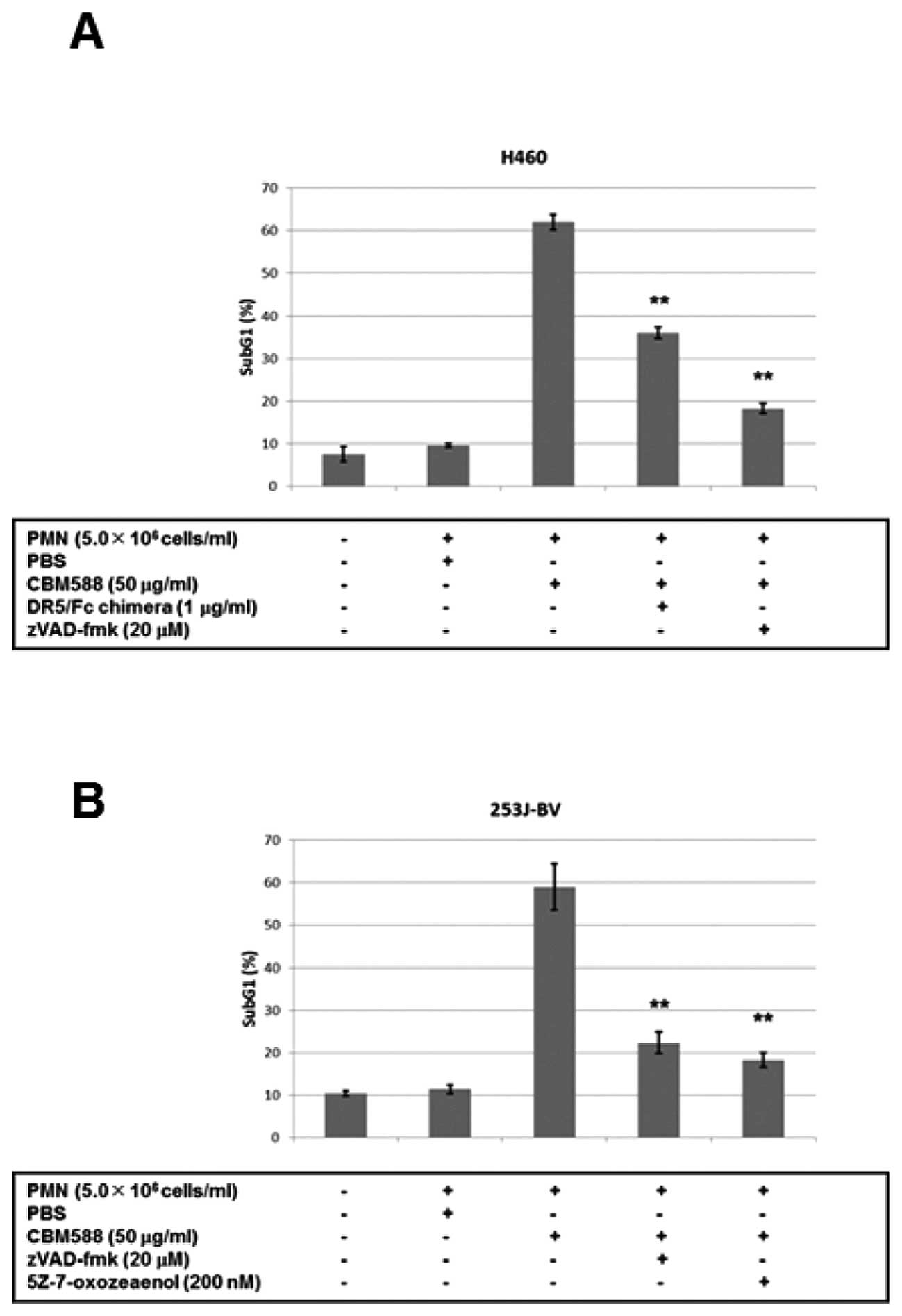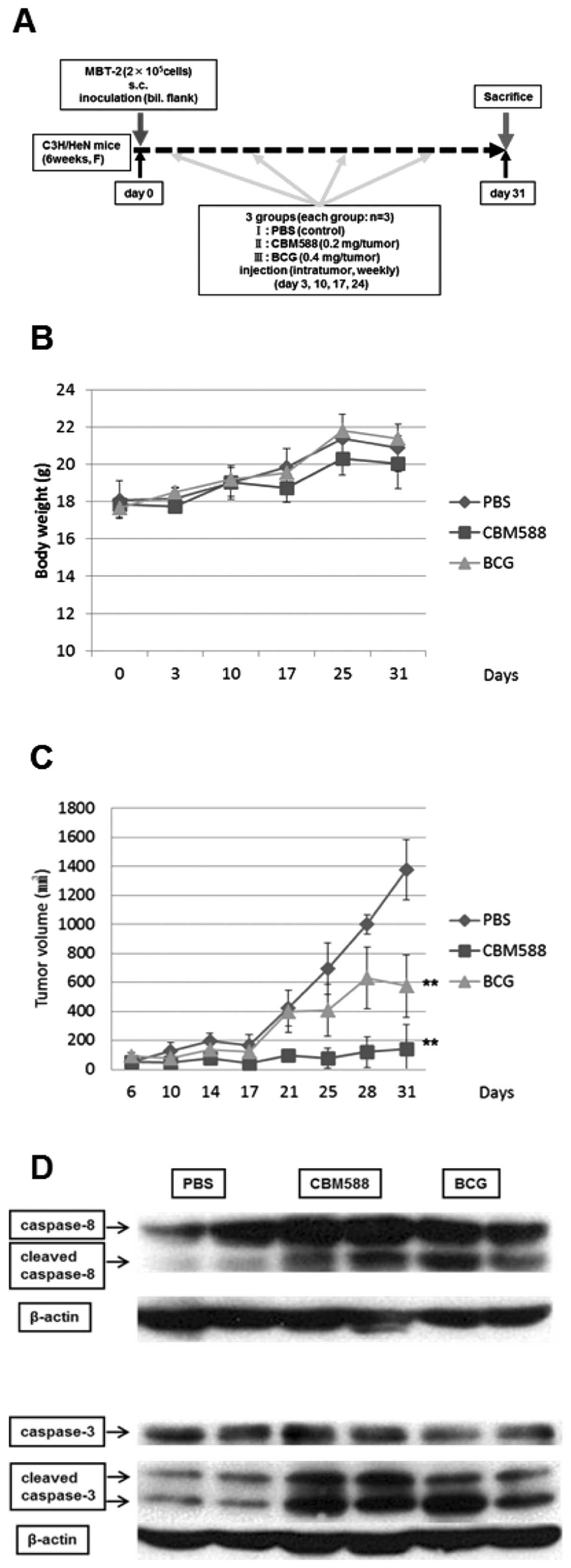|
1
|
Jemal A, Siegel R, Xu J and Ward E: Cancer
statistics, 2010. CA Cancer J Clin. 60:277–300. 2010. View Article : Google Scholar
|
|
2
|
Devesa SS, Blot WJ, Stone BJ, Miller BA,
Tarone RE and Fraumeni JF Jr: Recent cancer trends in the United
States. J Natl Cancer Inst. 87:175–182. 1995. View Article : Google Scholar : PubMed/NCBI
|
|
3
|
Hasui Y, Osada Y, Kitada S and Nishi S:
Significance of invasion to the muscularis mucosae on the
progression of superficial bladder cancer. Urology. 43:782–786.
1994. View Article : Google Scholar : PubMed/NCBI
|
|
4
|
Crispen R: History of BCG and its
substrains. Prog Clin Biol Res. 310:35–50. 1989.PubMed/NCBI
|
|
5
|
Morales A, Eidinger D and Bruce AW:
Intracavitary Bacillus Calmette-Guerin in the treatment of
superficial bladder tumors. J Urol. 116:180–183. 1976.PubMed/NCBI
|
|
6
|
Herr HW and Morales A: History of bacillus
Calmette-Guerin and bladder cancer: an immunotherapy success story.
J Urol. 179:53–56. 2008. View Article : Google Scholar
|
|
7
|
Borre S, Brustia D, Rosa F, Brondolo R,
Rizzo G and Garavelli PL: Calmette-Guerin bacillus disseminated
infection after intra vesical instillation. Recenti Prog Med.
93:247–248. 2002.(In Italian).
|
|
8
|
Elmer A, Bermes U, Drath L, Buscher E and
Viertel A: Sepsis and multiple organ failure after BCG-instillation
for bladder cancer. Internist. 45:935–939. 2004.(In German).
|
|
9
|
Takahashi T, Kushiro A, Nomoto K, et al:
Antitumor effects of the intravesical instillation of heat killed
cells of the Lactobacillus casei strain Shirota on the murine
orthotopic bladder tumor MBT-2. J Urol. 166:2506–2511. 2001.
View Article : Google Scholar
|
|
10
|
Seow SW, Cai S, Rahmat JN, et al:
Lactobacillus rhamnosus GG induces tumor regression in mice bearing
orthotopic bladder tumors. Cancer Sci. 101:751–758. 2010.
View Article : Google Scholar : PubMed/NCBI
|
|
11
|
Ludwig AT, Moore JM, Luo Y, et al: Tumor
necrosis factor-related apoptosis-inducing ligand: a novel
mechanism for Bacillus Calmette-Guerin-induced antitumor activity.
Cancer Res. 64:3386–3390. 2004. View Article : Google Scholar
|
|
12
|
Kemp TJ: Neutrophil stimulation with
Mycobacterium bovis bacillus Calmette-Guerin (BCG) results in the
release of functional soluble TRAIL/Apo-2L. Blood. 106:3474–3482.
2005. View Article : Google Scholar : PubMed/NCBI
|
|
13
|
Wiley SR, Schooley K, Smolak PJ, et al:
Identification and characterization of a new member of the TNF
family that induces apoptosis. Immunity. 3:673–682. 1995.
View Article : Google Scholar : PubMed/NCBI
|
|
14
|
Ashkenazi A, Pai RC, Fong S, et al: Safety
and antitumor activity of recombinant soluble Apo2 ligand. J Clin
Invest. 104:155–162. 1999. View Article : Google Scholar : PubMed/NCBI
|
|
15
|
Walczak H, Miller RE, Ariail K, et al:
Tumoricidal activity of tumor necrosis factor-related
apoptosis-inducing ligand in vivo. Nat Med. 5:157–163. 1999.
View Article : Google Scholar : PubMed/NCBI
|
|
16
|
Fesik SW: Promoting apoptosis as a
strategy for cancer drug discovery. Nat Rev Cancer. 5:876–885.
2005. View Article : Google Scholar : PubMed/NCBI
|
|
17
|
Soria JC, Smit E, Khayat D, et al: Phase
1b study of dulanermin (recombinant human Apo2L/TRAIL) in
combination with paclitaxel, carboplatin, and bevacizumab in
patients with advanced non-squamous non-small-cell lung cancer. J
Clin Oncol. 28:1527–1533. 2010. View Article : Google Scholar : PubMed/NCBI
|
|
18
|
Schonbeck U, Mach F and Libby P:
Generation of biologically active IL-1 beta by matrix
metalloproteinases: a novel caspase-1-independent pathway of IL-1
beta processing. J Immunol. 161:3340–3346. 1998.PubMed/NCBI
|
|
19
|
Van den Steen PE, Proost P, Wuyts A, Van
Damme J and Opdenakker G: Neutrophil gelatinase B potentiates
interleukin-8 tenfold by aminoterminal processing, whereas it
degrades CTAP-III, PF-4, and GRO-alpha and leaves RANTES and MCP-2
intact. Blood. 96:2673–2681. 2000.
|
|
20
|
McQuibban GA, Gong JH, Tam EM, McCulloch
CA, Clark-Lewis I and Overall CM: Inflammation dampened by
gelatinase A cleavage of monocyte chemoattractant protein-3.
Science. 289:1202–1206. 2000. View Article : Google Scholar : PubMed/NCBI
|
|
21
|
Black RA, Rauch CT, Kozlosky CJ, et al: A
metalloproteinase disintegrin that releases tumour-necrosis
factor-alpha from cells. Nature. 385:729–733. 1997. View Article : Google Scholar : PubMed/NCBI
|
|
22
|
Kawakubo T, Okamoto K, Iwata J, et al:
Cathepsin E prevents tumor growth and metastasis by catalyzing the
proteolytic release of soluble TRAIL from tumor cell surface.
Cancer Res. 67:10869–10878. 2007. View Article : Google Scholar : PubMed/NCBI
|
|
23
|
Weinlich R, Brunner T and Amarante-Mendes
GP: Control of death receptor ligand activity by posttranslational
modifications. Cell Mol Life Sci. 67:1631–1642. 2010. View Article : Google Scholar : PubMed/NCBI
|
|
24
|
Dinney CP, Fishbeck R, Singh RK, et al:
Isolation and characterization of metastatic variants from human
transitional cell carcinoma passaged by orthotopic implantation in
athymic nude mice. J Urol. 154:1532–1538. 1995. View Article : Google Scholar : PubMed/NCBI
|
|
25
|
Taniguchi H, Yoshida T, Horinaka M, et al:
Baicalein overcomes tumor necrosis factor-related
apoptosis-inducing ligand resistance via two different
cell-specific pathways in cancer cells but not in normal cells.
Cancer Res. 68:8918–8927. 2008. View Article : Google Scholar
|
|
26
|
Matsubara H, Mizutani Y, Hongo F, et al:
Gene therapy with TRAIL against renal cell carcinoma. Mol Cancer
Ther. 5:2165–2171. 2006. View Article : Google Scholar : PubMed/NCBI
|
|
27
|
Okamoto T, Sasaki M, Tsujikawa T, Fujiyama
Y, Bamba T and Kusunoki M: Preventive efficacy of butyrate enemas
and oral administration of Clostridium butyricum M588 in dextran
sodium sulfate-induced colitis in rats. J Gastroenterol.
35:341–346. 2000. View Article : Google Scholar : PubMed/NCBI
|
|
28
|
Seki H, Shiohara M, Matsumura T, et al:
Prevention of antibiotic-associated diarrhea in children by
Clostridium butyricum MIYAIRI. Pediatr Int. 45:86–90. 2003.
View Article : Google Scholar : PubMed/NCBI
|
|
29
|
Akira S, Takeda K and Kaisho T: Toll-like
receptors: critical proteins linking innate and acquired immunity.
Nat Immunol. 2:675–680. 2001. View
Article : Google Scholar : PubMed/NCBI
|
|
30
|
Takeda K and Akira S: Roles of Toll-like
receptors in innate immune responses. Genes Cells. 6:733–742. 2001.
View Article : Google Scholar : PubMed/NCBI
|
|
31
|
Heldwein KA, Liang MD, Andresen TK, et al:
TLR2 and TLR4 serve distinct roles in the host immune response
against Mycobacterium bovis BCG. J Leukoc Biol. 74:277–286. 2003.
View Article : Google Scholar : PubMed/NCBI
|
|
32
|
Godaly G and Young DB: Mycobacterium bovis
bacille Calmette Guerin infection of human neutrophils induces
CXCL8 secretion by MyD88-dependent TLR2 and TLR4 activation. Cell
Microbiol. 7:591–601. 2005. View Article : Google Scholar : PubMed/NCBI
|
|
33
|
Ninomiya-Tsuji J, Kajino T, Ono K, et al:
A resorcylic acid lactone, 5Z-7-oxozeaenol, prevents inflammation
by inhibiting the catalytic activity of TAK1 MAPK kinase kinase. J
Biol Chem. 278:18485–18490. 2003. View Article : Google Scholar : PubMed/NCBI
|
|
34
|
Owen CA, Hu Z, Lopez-Otin C and Shapiro
SD: Membrane-bound matrix metalloproteinase-8 on activated
polymorphonuclear cells is a potent, tissue inhibitor of
metalloproteinase-resistant collagenase and serpinase. J Immunol.
172:7791–7803. 2004. View Article : Google Scholar
|
|
35
|
Pei D: Leukolysin/MMP25/MT6-MMP: a novel
matrix metal-loproteinase specifically expressed in the leukocyte
lineage. Cell Res. 9:291–303. 1999. View Article : Google Scholar : PubMed/NCBI
|
|
36
|
Faurschou M and Borregaard N: Neutrophil
granules and secretory vesicles in inflammation. Microbes Infect.
5:1317–1327. 2003. View Article : Google Scholar : PubMed/NCBI
|
|
37
|
Kamat AM, Tharakan ST, Sung B and Aggarwal
BB: Curcumin potentiates the antitumor effects of Bacillus
Calmette-Guerin against bladder cancer through the downregulation
of NF-κB and upregulation of TRAIL receptors. Cancer Res.
69:8958–8966. 2009.PubMed/NCBI
|
|
38
|
Fujii H, Saimoto A, Nishikawa K, Yamazaki
S and Kameyama S: Effect of BCG Connaught strain on mouse bladder
tumor models. Biotherapy. 17:167–173. 2003.
|
|
39
|
Shimbo I, Yamaguchi T, Odaka T, et al:
Effect of Clostridium butyricum on fecal flora in Helicobacter
pylori eradication therapy. World J Gastroenterol. 11:7520–7524.
2005.PubMed/NCBI
|
|
40
|
Stricker P, Pryor K, Nicholson T, et al:
Bacillus Calmette-Guerin plus intravesical interferon alpha-2b in
patients with superficial bladder cancer. Urology. 48:952–961.
1996. View Article : Google Scholar : PubMed/NCBI
|
|
41
|
Esuvaranathan K, Chiong E, Thamboo TP, et
al: Predictive value of p53 and pRb expression in superficial
bladder cancer patients treated with BCG and interferon-alpha.
Cancer. 109:1097–1105. 2007. View Article : Google Scholar : PubMed/NCBI
|
|
42
|
Yoshida T, Horinaka M and Sakai T:
‘Combination-oriented molecular-targeting prevention’ of cancer: a
model involving the combination of TRAIL and a DR5 inducer. Environ
Health Prev Med. 15:203–210. 2010.
|
|
43
|
Matsui TA, Sowa Y, Yoshida T, et al:
Sulforaphane enhances TRAIL-induced apoptosis through the induction
of DR5 expression in human osteosarcoma cells. Carcinogenesis.
27:1768–1777. 2006. View Article : Google Scholar : PubMed/NCBI
|
|
44
|
Shan Y, Sun C, Zhao X, Wu K, Cassidy A and
Bao Y: Effect of sulforaphane on cell growth, G(0)/G(1) phase cell
progression and apoptosis in human bladder cancer T24 cells. Int J
Oncol. 29:883–888. 2006.PubMed/NCBI
|
|
45
|
Munday R, Mhawech-Fauceglia P, Munday CM,
et al: Inhibition of urinary bladder carcinogenesis by broccoli
sprouts. Cancer Res. 68:1593–1600. 2008. View Article : Google Scholar : PubMed/NCBI
|
|
46
|
Nomura T and Katunuma N: Involvement of
cathepsins in the invasion, metastasis and proliferation of cancer
cells. J Med Invest. 52:1–9. 2005. View Article : Google Scholar : PubMed/NCBI
|
|
47
|
Overall CM and Kleifeld O: Tumour
microenvironment -opinion: validating matrix metalloproteinases as
drug targets and anti-targets for cancer therapy. Nat Rev Cancer.
6:227–239. 2006. View Article : Google Scholar
|
|
48
|
Coussens LM, Fingleton B and Matrisian LM:
Matrix metalloproteinase inhibitors and cancer: trials and
tribulations. Science. 295:2387–2392. 2002. View Article : Google Scholar : PubMed/NCBI
|
|
49
|
Overall CM and Lopez-Otin C: Strategies
for MMP inhibition in cancer: innovations for the post-trial era.
Nat Rev Cancer. 2:657–672. 2002. View
Article : Google Scholar : PubMed/NCBI
|















